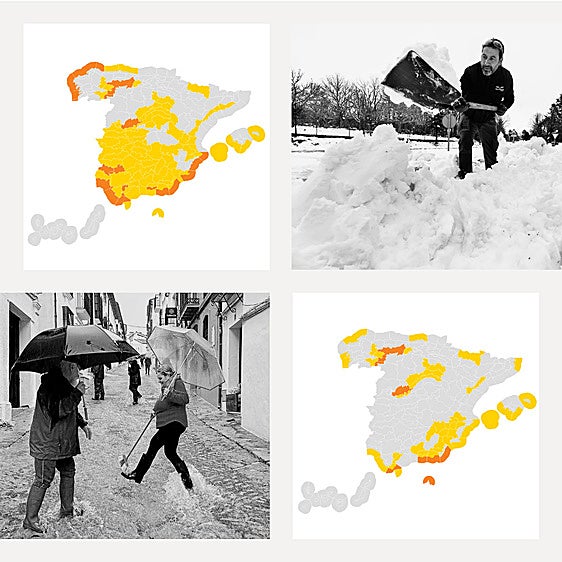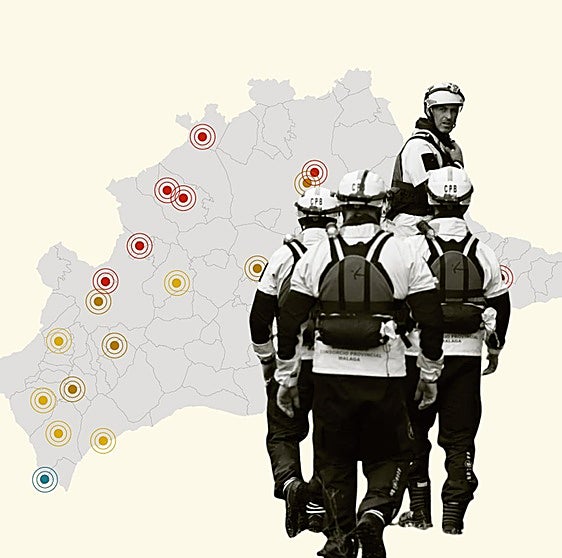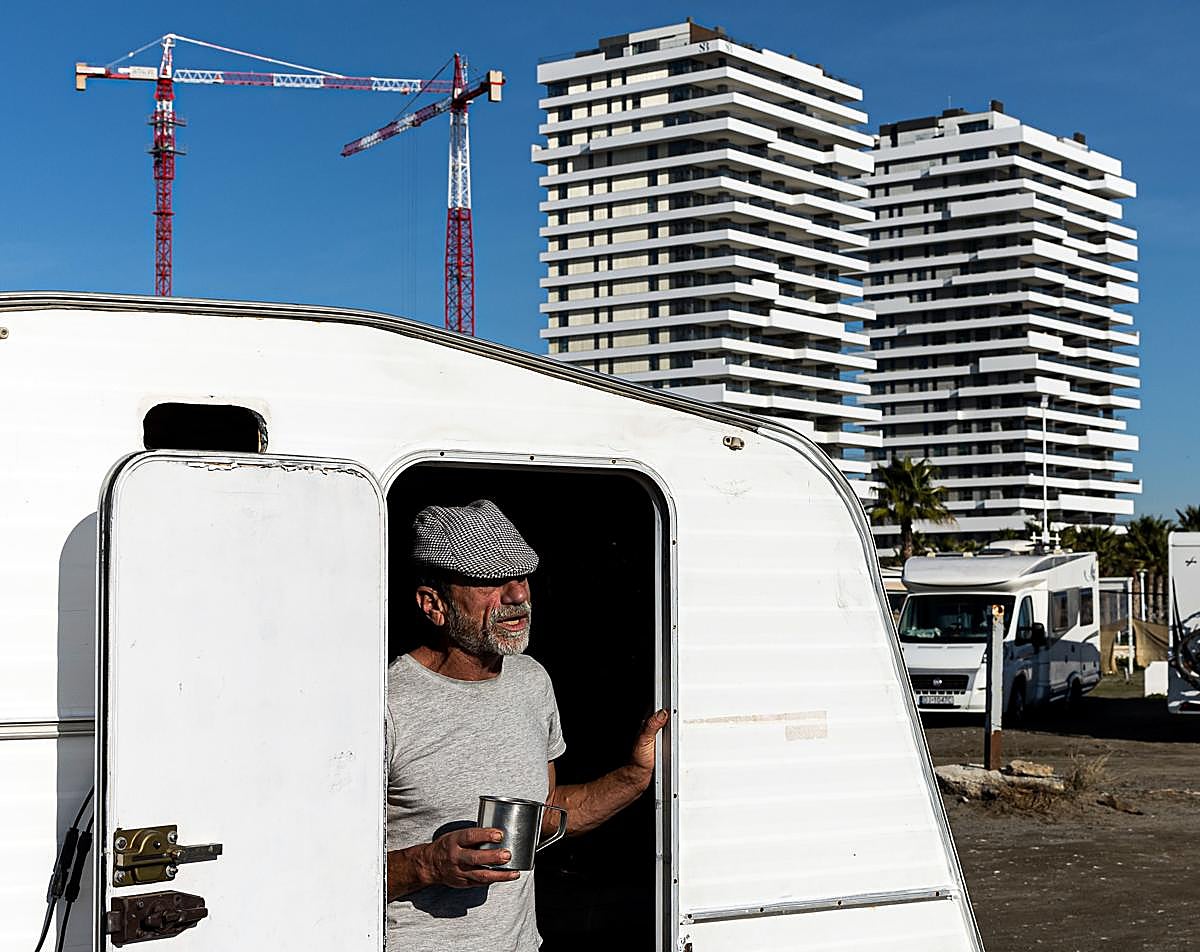
Taking your house on the road: life in a motorhome
Los Álamos, Sacaba beach and a site near the Martín Carpena arena are just three areas of the Costa del Sol that have become unusual neighbourhoods, where 'homeless', 'alternatives', pensioners and even digital nomads share their lives on wheels
So many back stories. Each has a tale to tell among those who, by choice or happenstance, have ended up living in a motorhome on the Costa del Sol. Tales too from those living the van life, who have chosen campervan conversions to save money in their new way of life, or to free them from the parking restrictions of a motorhome.
Many are free spirits, men and women seeking an alternative lifestyle to the mainstream, consumer-driven society, either for just a while or forever, mostly while studying or working or after retirement. The more conventional thinkers among us might be tempted to assume that some material hardship pushed them to lead such a life on the margins of society. Yet their words suggest that they have caught a taste of true freedom with this lifestyle and they claim to enjoy it to the full, in spite of what might be down the road. This is the case of one man who has already passed retirement age. He spouts philosophical words worthy of Socrates without realising it, giving us a speech in favour of autonomous learning throughout life. Then he says he does not want to live in an apartment (he regards that as "prison"). He just wants to enjoy his own company with his two cats and his few belongings that clutter up his van and seem to be his only assets, after having tired of a former champagne lifestyle. He now keeps a clear head and avoids alcohol. He probably also steers clear of people, as he gives neither his name nor a picture to SUR.
Juan and José
Home is a caravan following a marriage split
Juan, 60, on the other hand, was happy to tell us his story. When SUR approached him for an interview he was busy with home improvements to the insulation of his caravan. Marital separation triggered his lifestyle change. He admits that he wanted to give a new focus to his life and he has been in his house on wheels for three years after some time living in a car. In winter he stays in Sacaba, a beach on the west side of Malaga city, and for summer he heads to Campo de Gibraltar, largely because, he tells us, when more tourists appear in Malaga, the authorities evict people like him from those prime parking spaces right by the beach.

Photo: Ñito Salas
Juan, 60
“Thank God, I don't work and I don't need to. When you have few expenses, you can live on very little. People are slaves to their stuff, we’re told what we should have, when all we need is a place to sleep”

Photo: Ñito Salas
Juan, 60
“Thank God, I don't work and I don't need to. When you have few expenses, you can live on very little. People are slaves to their stuff, we’re told what we should have, when all we need is a place to sleep”
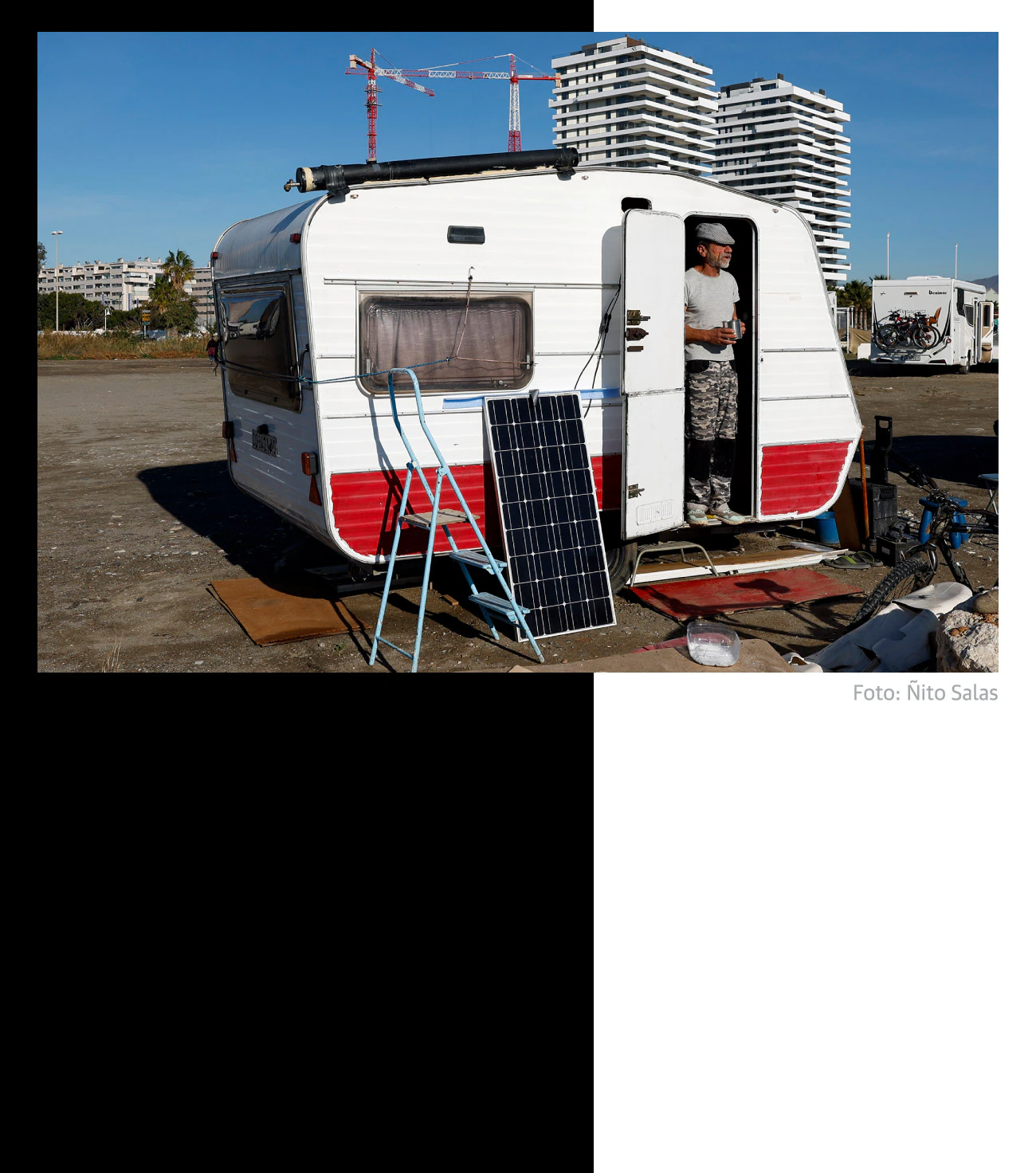
Juan, 60
“Thank God, I don't work and I don't need to. When you have few expenses, you can live on very little. People are slaves to their stuff, we’re told what we should have, when all we need is a place to sleep”
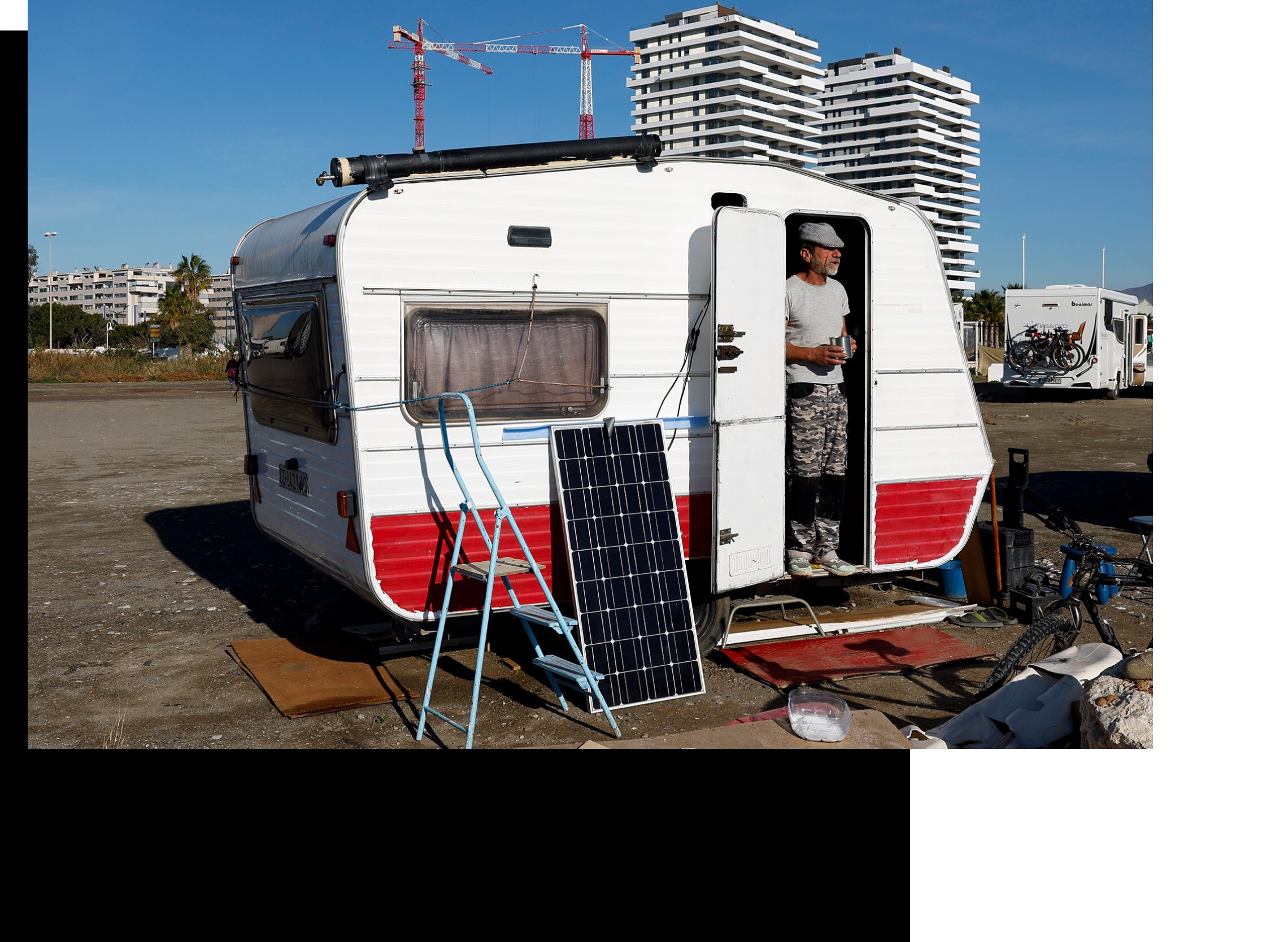
Photo: Ñito Salas
Juan, 60
“Thank God, I don't work and I don't need to. When you have few expenses, you can live on very little. People are slaves to their stuff, we’re told what we should have, when all we need is a place to sleep”
"Thank God, I don't work and I don't need to," he says: "When you have so few expenses, you can live on very little; I needed everything in the past, but now I want for nothing." He goes on: "People are slaves to their stuff, we're told what we should have, when all we need is a place just to be and sleep... I don't have a TV, but when I wake up I can see the sea." Yes, he does lose track of time, but he's okay with that, because he keeps to his sacred rules for living well: exercise, healthy eating, rest and inner peace.
"Every day I have things to do. I'm not lazing around all day," he says firmly. Yet his life and home, like that of his neighbour the philosopher-with-no-name, paint a rather rundown sight - a radical contrast to some of the most expensive apartments in Malaga being built across the road, with famous neighbours such as Antonio Banderas or the footballer Isco, who have bought there.
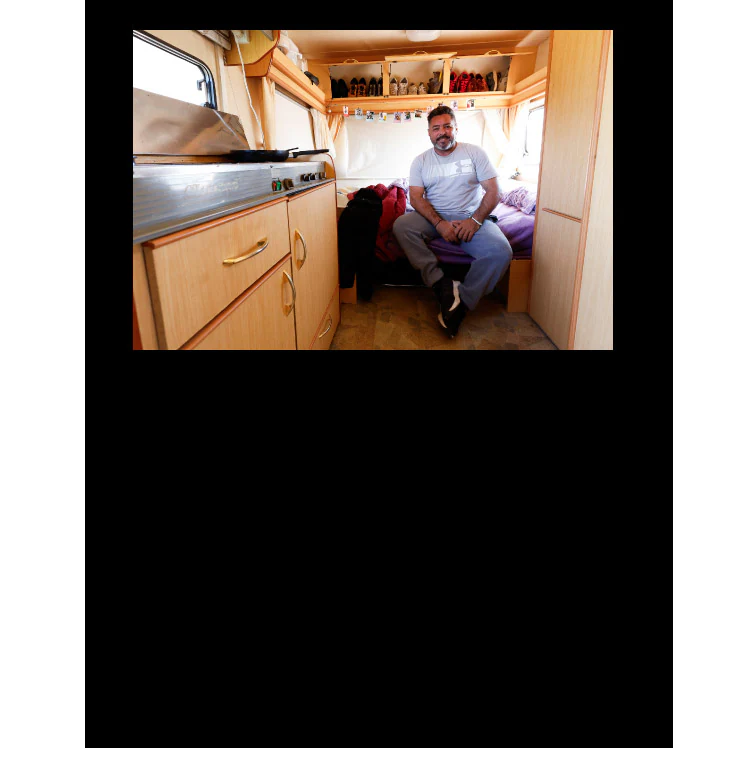
Photo: Ñito Salas
José, 46
“I'm fine here. Why would I go pay some landlord 700 euros?”
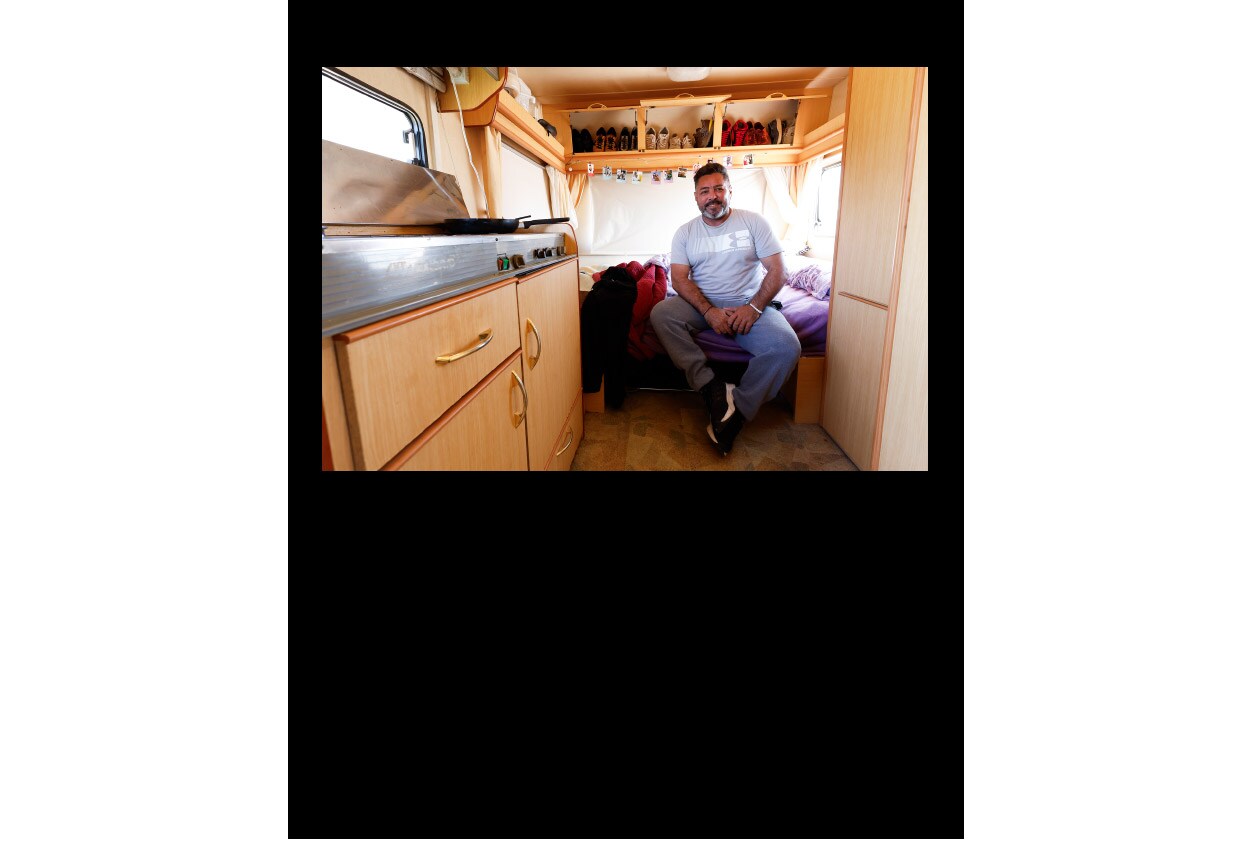
Photo: Ñito Salas
José, 46
“I'm fine here. Why would I go pay some landlord 700 euros?”
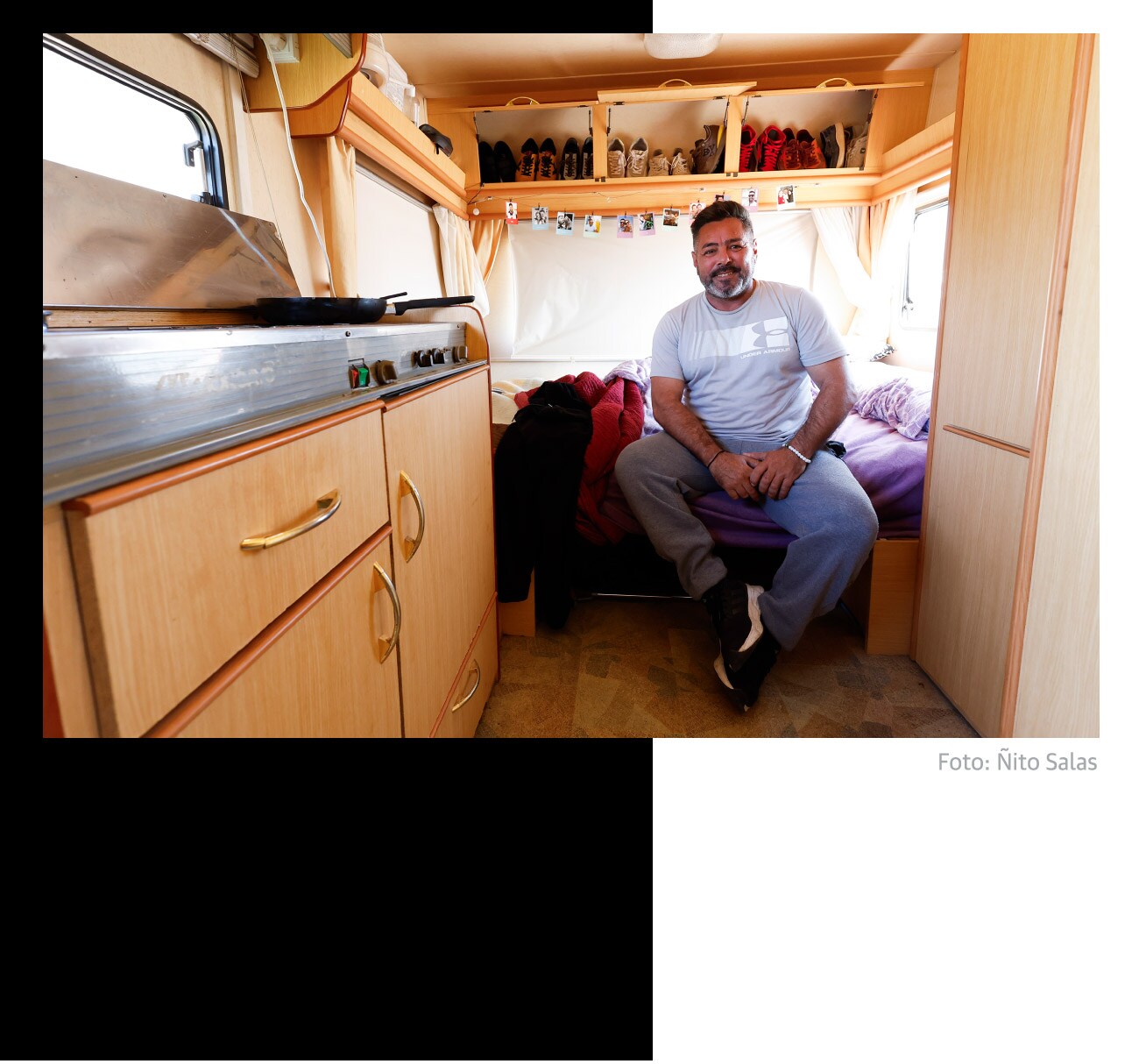
José, 46
“I'm fine here. Why would I go pay some landlord 700 euros?”
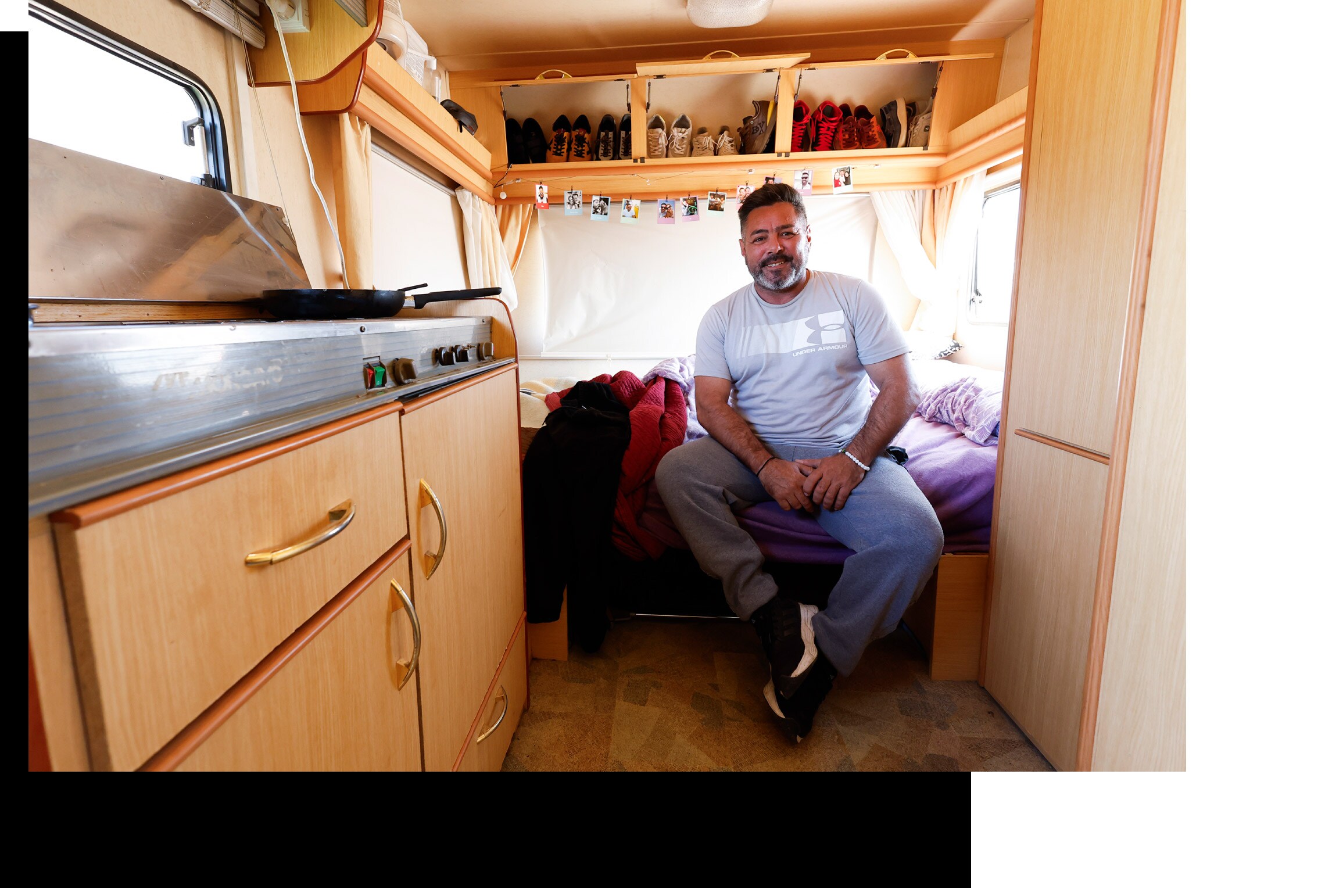
Photo: Ñito Salas
José, 46
“I'm fine here. Why would I go pay some landlord 700 euros?”
t's the same story in Los Álamos. This car park, full of caravans, serves as a 'border' between Malaga city and Torremolinos, right next to high-end housing developments. The very privileged buyers will have 46-year-old José as their neighbour. When he separated from his partner, he moved back to his mother's, but then he decided to branch out alone, buying a caravan for 4,500 euros. Since then he has been weather-proofing it: a new roof to prevent overheating in summer and in winter it is heated thanks to solar panels. In fact, since they produce more electricity than he needs, the energy goes to others camping on the site. That said, he confesses that he showers at his local gym.
He shows us the caravan's interior: a kitchen complete with fridge, a wider-than-average single bed, a tiny bathroom, his television set and cupboards with his much-loved and huge collection of trainers. "I'm fine here. Why would I go pay some landlord 700 euros?" he says. He pays a daily rate of two euros to stay parked. His girlfriend lives in Bilbao in a house on which she pays a mortgage. He tried to move there, but he says that the climate there is not for him: "It's as if someone had applied a sad, grey filter to the landscape." So he doubts there's a future for their relationship as it does not look like she will move to the Costa del Sol when she also has a business in the Basque Country. She only visits occasionally, which is when, José openly admits, he gives his house on wheels a spring clean.
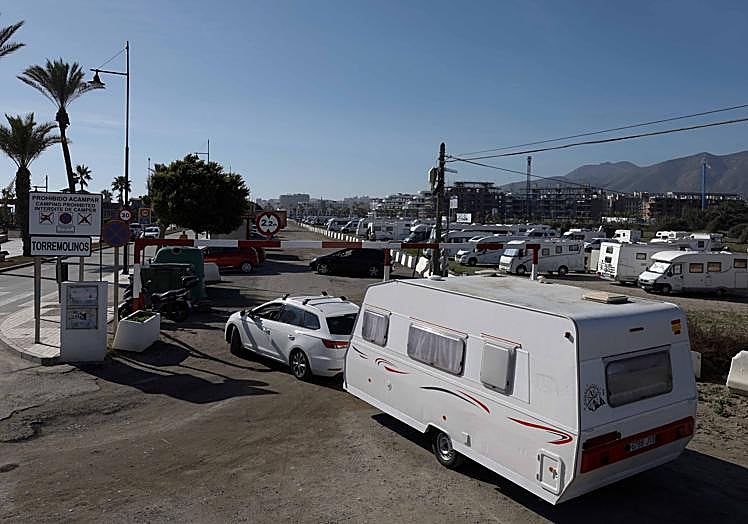
He is adamant that caravanning has made him less materialistic, he has realised that he can live with less: "When I had more money, I threw it down the drain; I'd think about buying a big car, I wouldn't do that now. Twenty years ago I could never have pictured myself living in a caravan, and look at me now... And I can live normal life like anyone else. Yes, I'm unemployed, but if not, I'd be driving to work every day from here."
Ángel
Jobless and immobile next to the Martín Carpena
Although José likes van life, his story underlines Malaga's big housing issue - rents are expensive. Additionally for Ángel, 55, employment is the bigger issue. He tells us that he came to Malaga looking for work four years ago, but then the pandemic happened and he was left out in the cold. He tried to find a temporary solution by camping with a tent until moved on by police.

Photo: Ñito Salas
Ángel, 55
“I came to Malaga looking for work four years ago, but then the pandemic happened and I was out on the streets. At first I lived in a tent and then they gave me a van for free”.
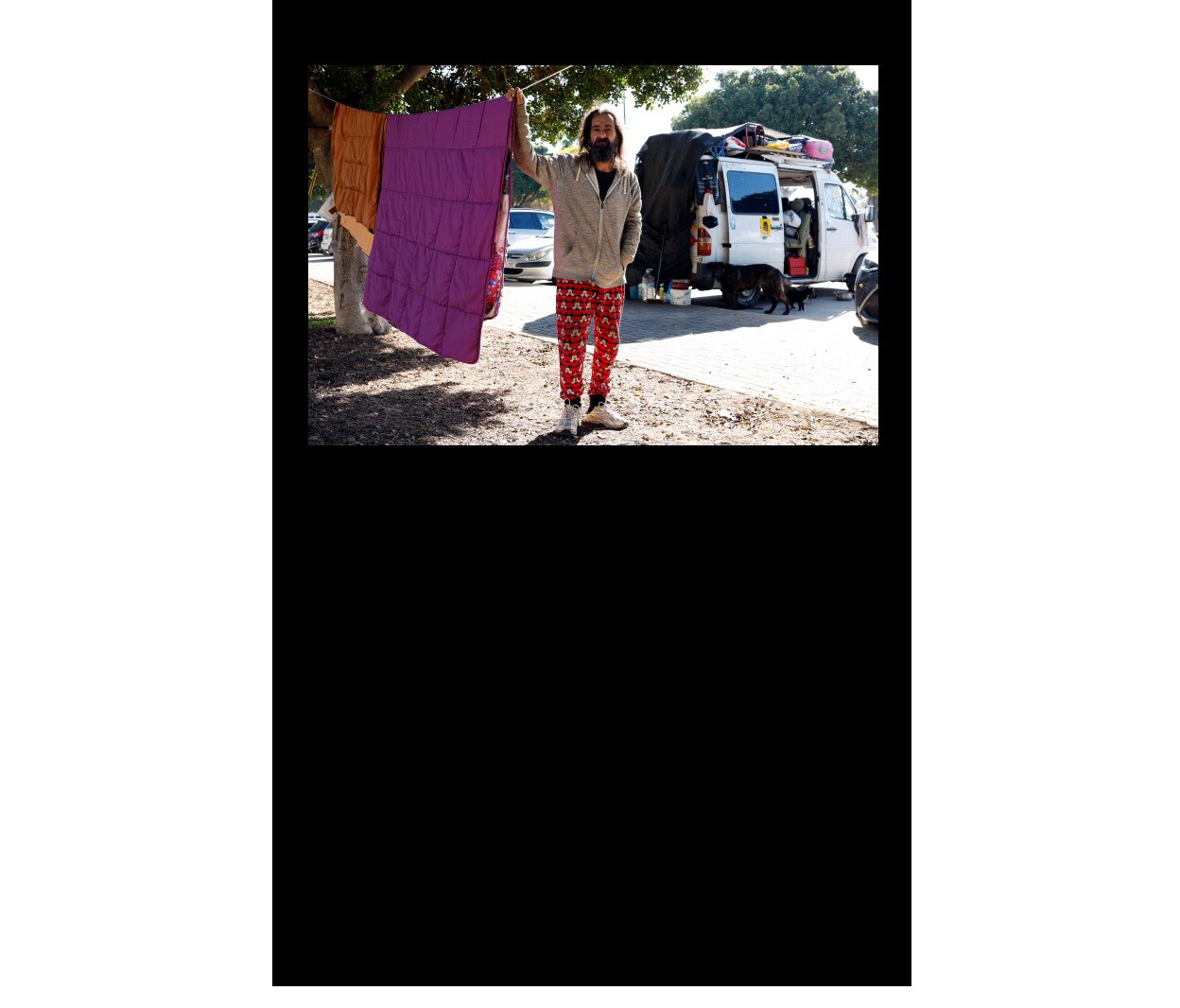
Photo: Ñito Salas
Ángel, 55
“I came to Malaga looking for work four years ago, but then the pandemic happened and I was out on the streets. At first I lived in a tent and then they gave me a van for free”
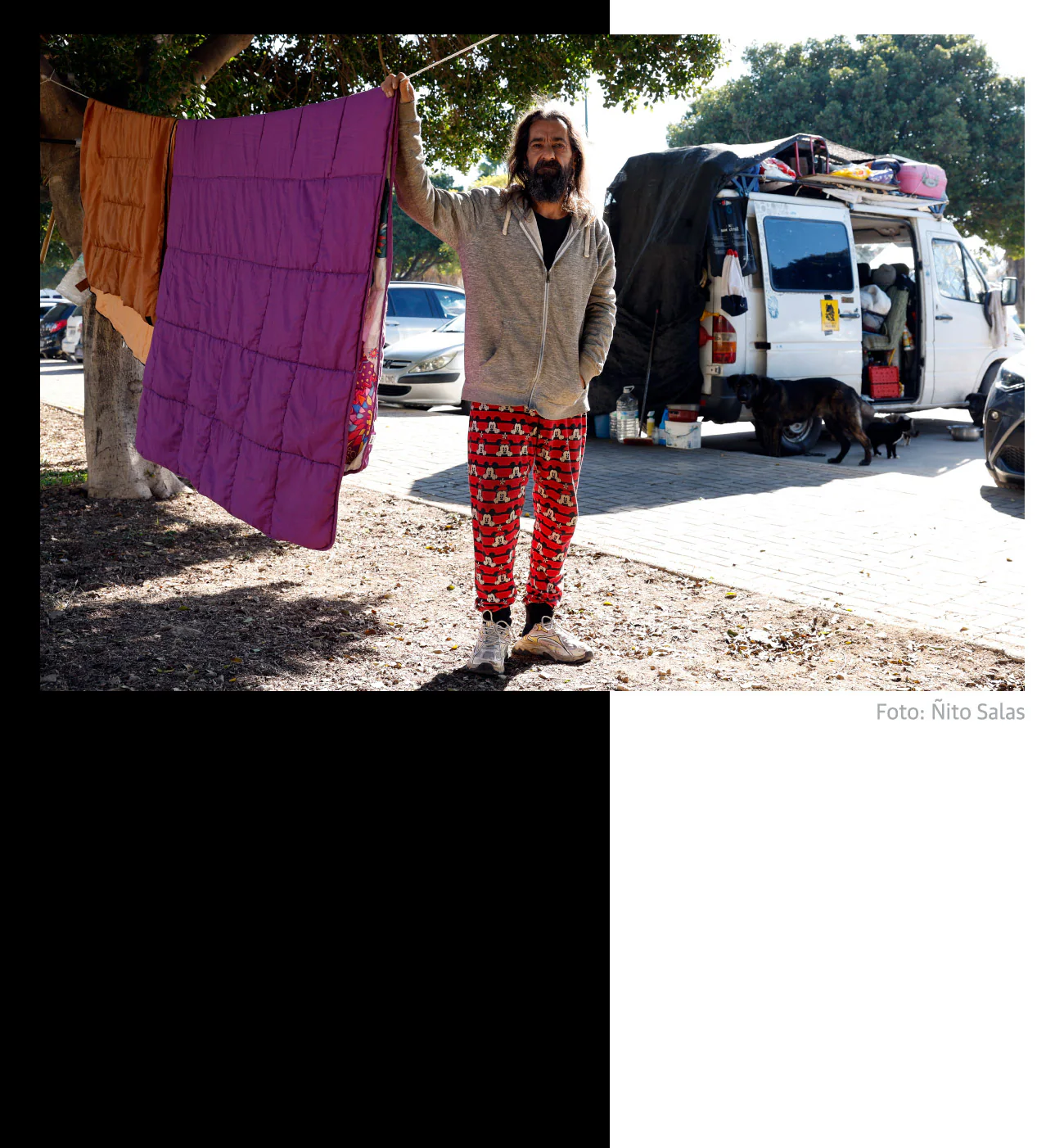
Ángel, 55
“I came to Malaga looking for work four years ago, but then the pandemic happened and I was out on the streets. At first I lived in a tent and then they gave me a van for free”
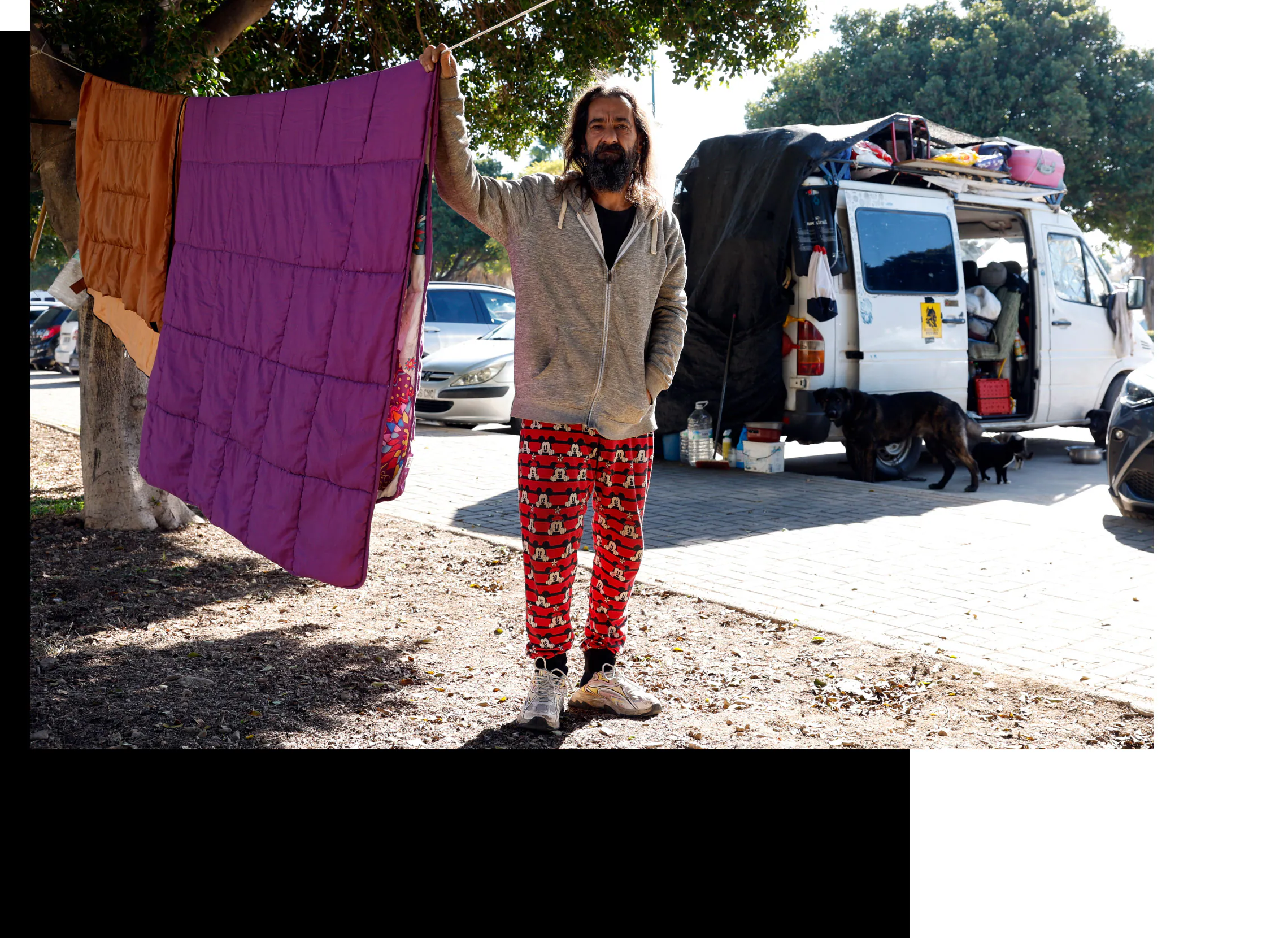
Photo: Ñito Salas
Ángel, 55
“I came to Malaga looking for work four years ago, but then the pandemic happened and I was out on the streets. At first I lived in a tent and then they gave me a van for free”
Then, he tells us, he was given a van where he now lives with his partner, Nadia, 24, as well as four dogs and six cats next to the Martín Carpena arena. Unfortunately, the vehicle is uninsured and without MOT, and cannot be moved. So he has been trapped there for two years. He showers outdoors by filling a bag with water and heating it up in the sun. He complains that the town hall has been capping off water outlets around them due to the abuse that he's noted among caravan owners parked on the site. "They could have been more discreet, you can't go filling up four five-litre water bottles in the middle of the day, but they don't care as they can leave whenever they want."
Fleming, 60
Waiting for that plot of land
Within this freewheeling community there are many non-Spanish members. Fleming is a 60-year-old Dane who retired early from the building industry and began touring Europe staying in hostels until he was robbed in Portugal and his passport was taken. Having no photo ID, he could not rent a room anywhere, so he bought a caravan, and thus serendipity and necessity made this form of travel his way of life.
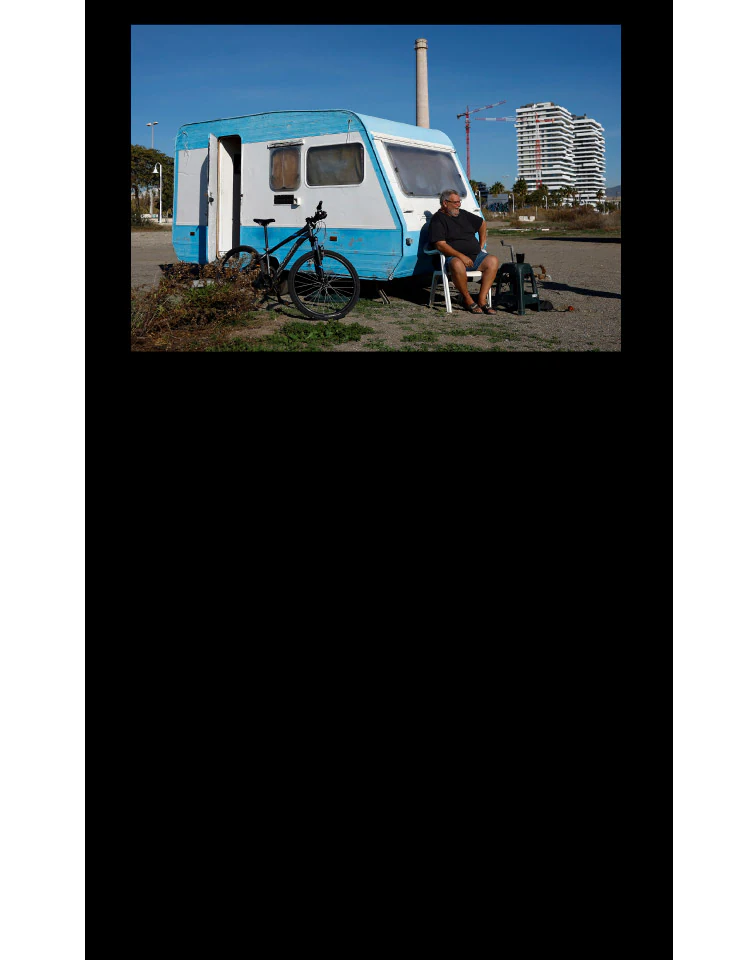
Photo: Ñito Salas
Fleming, 60
Denmark
“I bought a caravan out of necessity, but I don’t regret it at all. That said, I’m looking for a plot of land to build a house and settle down”
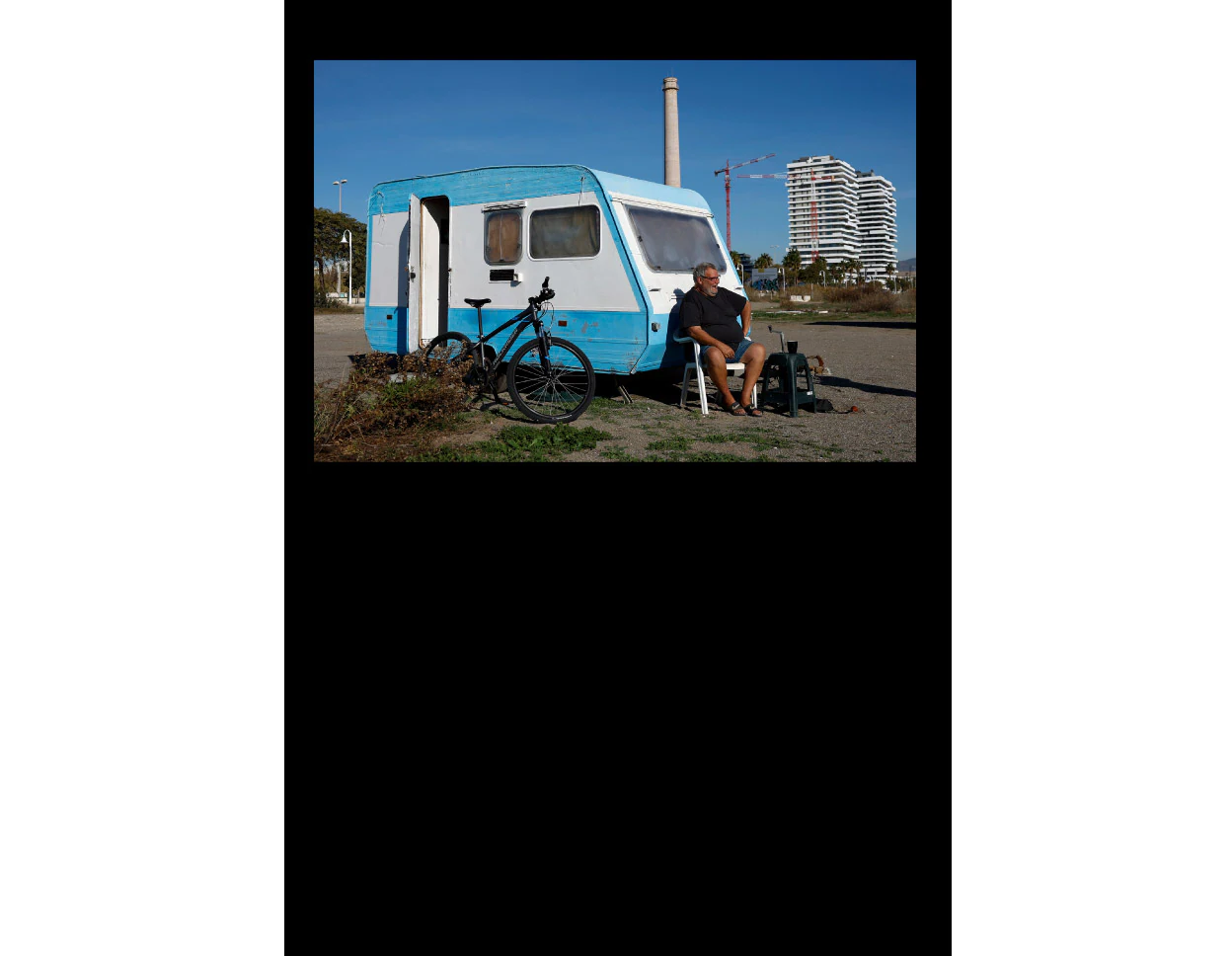
Photo: Ñito Salas
Fleming, 60
Denmark
“I bought a caravan out of necessity, but I don’t regret it at all. That said, I’m looking for a plot of land to build a house and settle down”
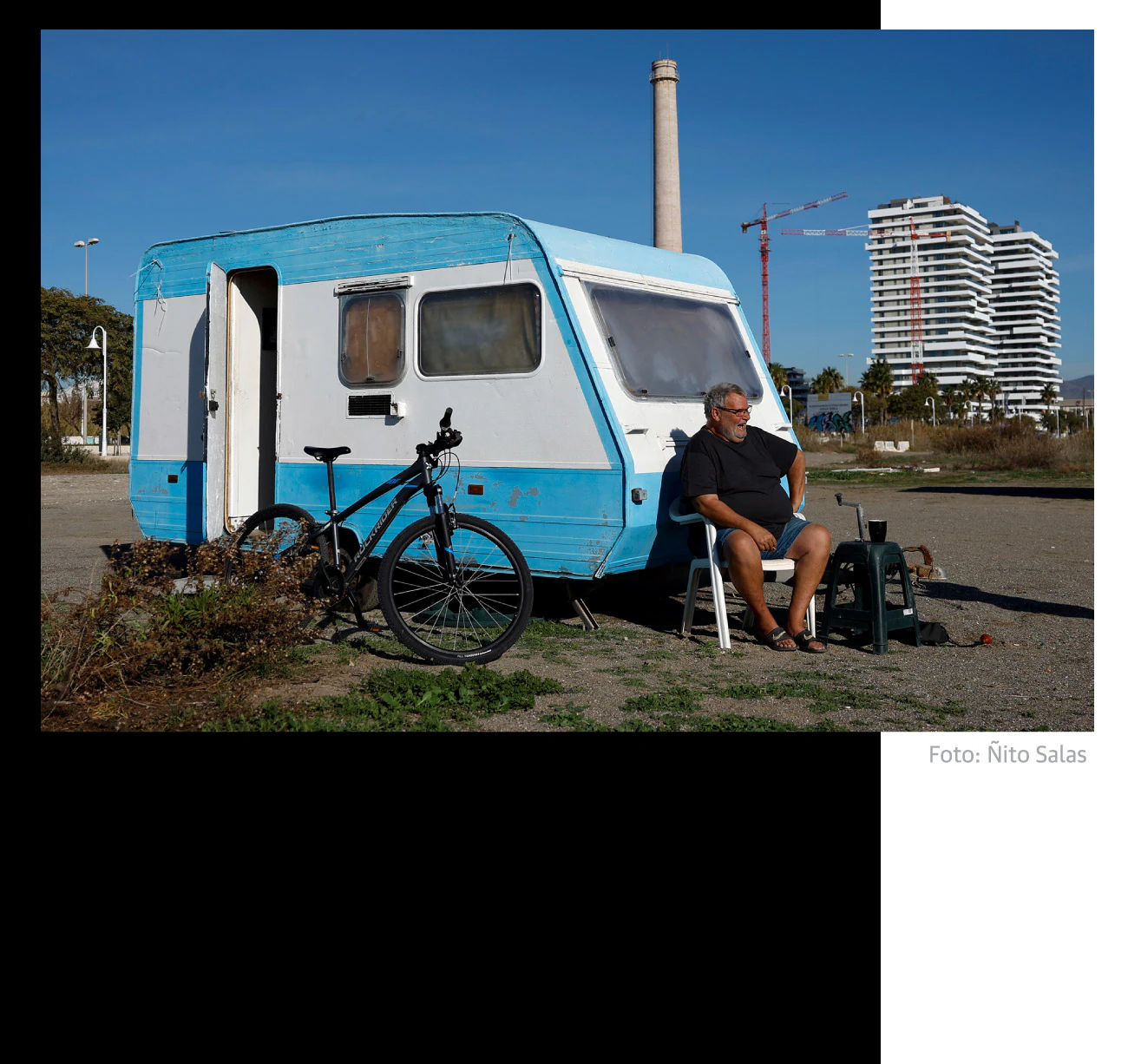
Fleming, 60 años
Denmark
“I bought a caravan out of necessity, but I don’t regret it at all. That said, I’m looking for a plot of land to build a house and settle down”
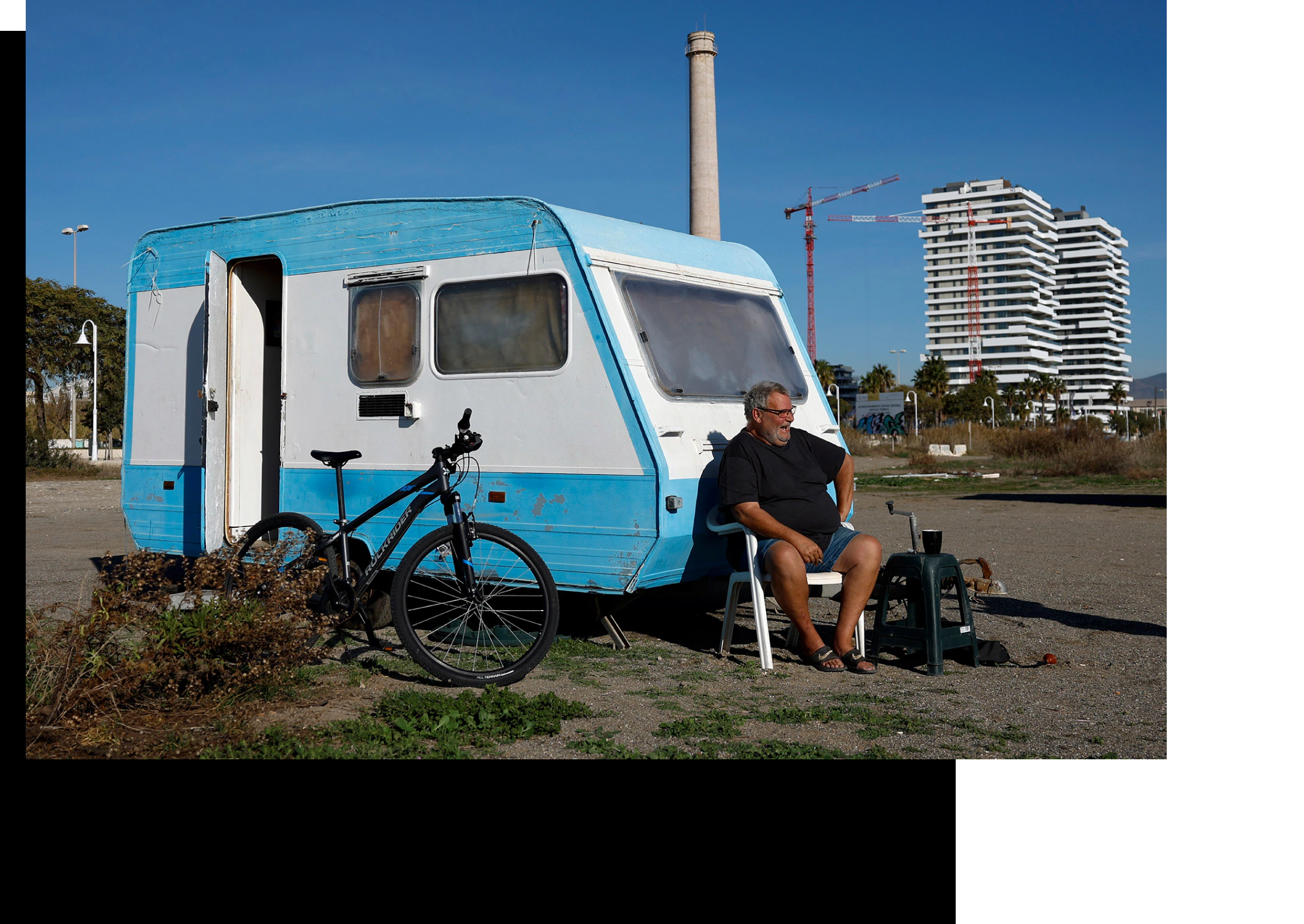
Photo: Ñito Salas
Fleming, 60 años
Denmark
“I bought a caravan out of necessity, but I don’t regret it at all. That said, I’m looking for a plot of land to build a house and settle down”
Nevertheless, what he really wants is to settle somewhere once he finds the land where he can build a house. Naturally, this must be somewhere from Granada southwards as he hates the cold. He certainly doesn't want to return to his home country, not only for the climate but also because he'd lose two thirds of his pension paying rent and household bills. Meanwhile, until he finds a place to settle down, he's enjoying his caravan experience and he lives comfortably despite it all stemming from a bad experience: "I have everything inside; it's like being in a small apartment."
Wilson, 27, and Tamara, 33
"Nomads, not hippies"
There are also those who combine this way of life with a conventional job. This is the case with Wilson, a 27-year-old from Portugal. He works in Switzerland, in the construction sector. When he's over there working, he stays in hotels. When his contract ends, he sets off with his caravan and travels the world. For now he has landed in Malaga, Sacaba to be precise.

Photo: Ñito Salas
Wilson, 27
Portugal
“You can be a nomad without being a hippy; there are hippies who always live in the same place; I regard myself more nomad than hippy”
Tamara, 33
Germany
“Germany is just one reality and I wanted to see different realities. In rich countries I take whatever work comes my way and I save to continue travelling”
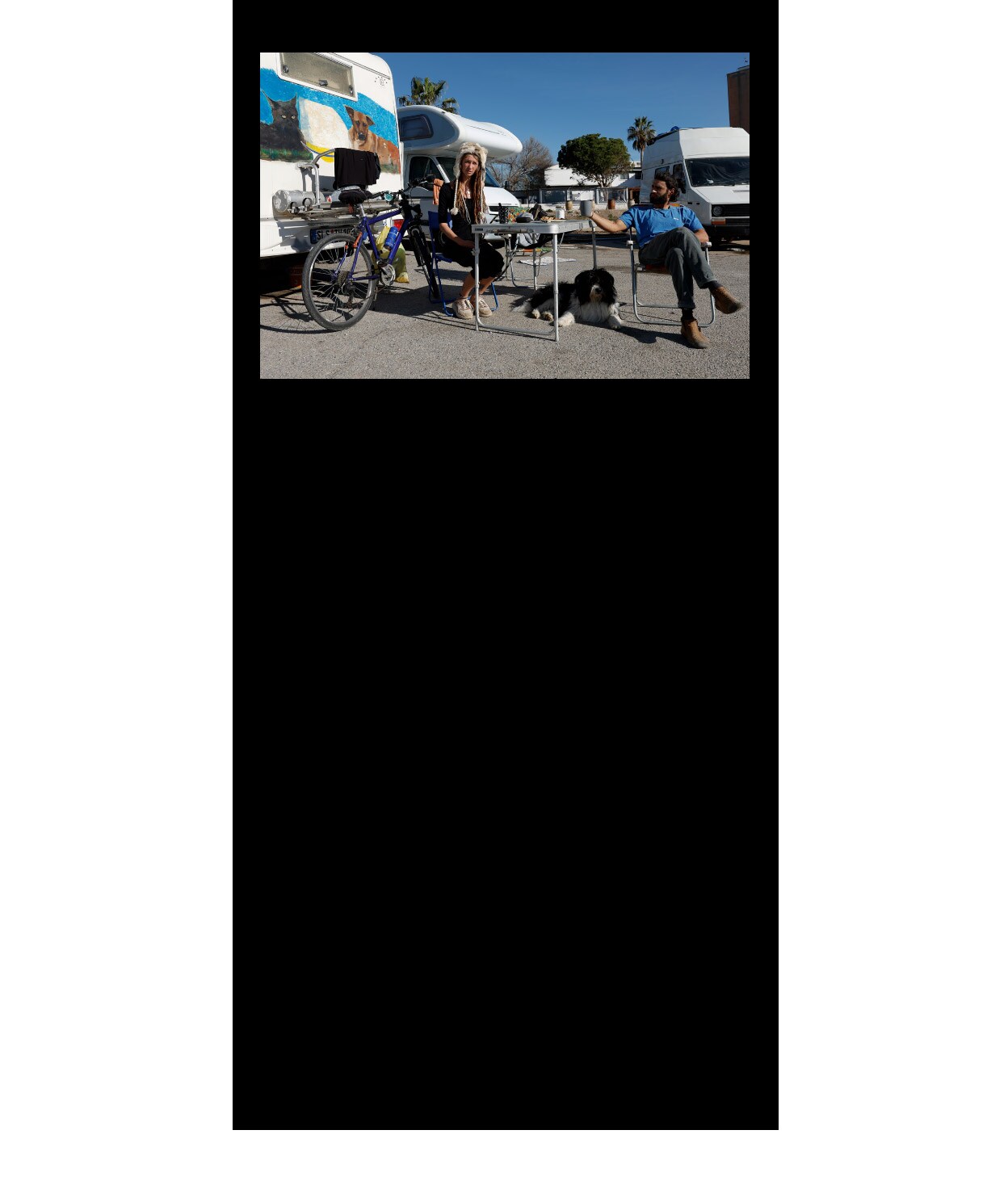
Photo: Ñito Salas
Wilson, 27
Portugal
“You can be a nomad without being a hippy; there are hippies who always live in the same place; I regard myself more nomad than hippy”
Tamara, 33
Germany
“Germany is just one reality and I wanted to see different realities. In rich countries I take whatever work comes my way and I save to continue travelling”
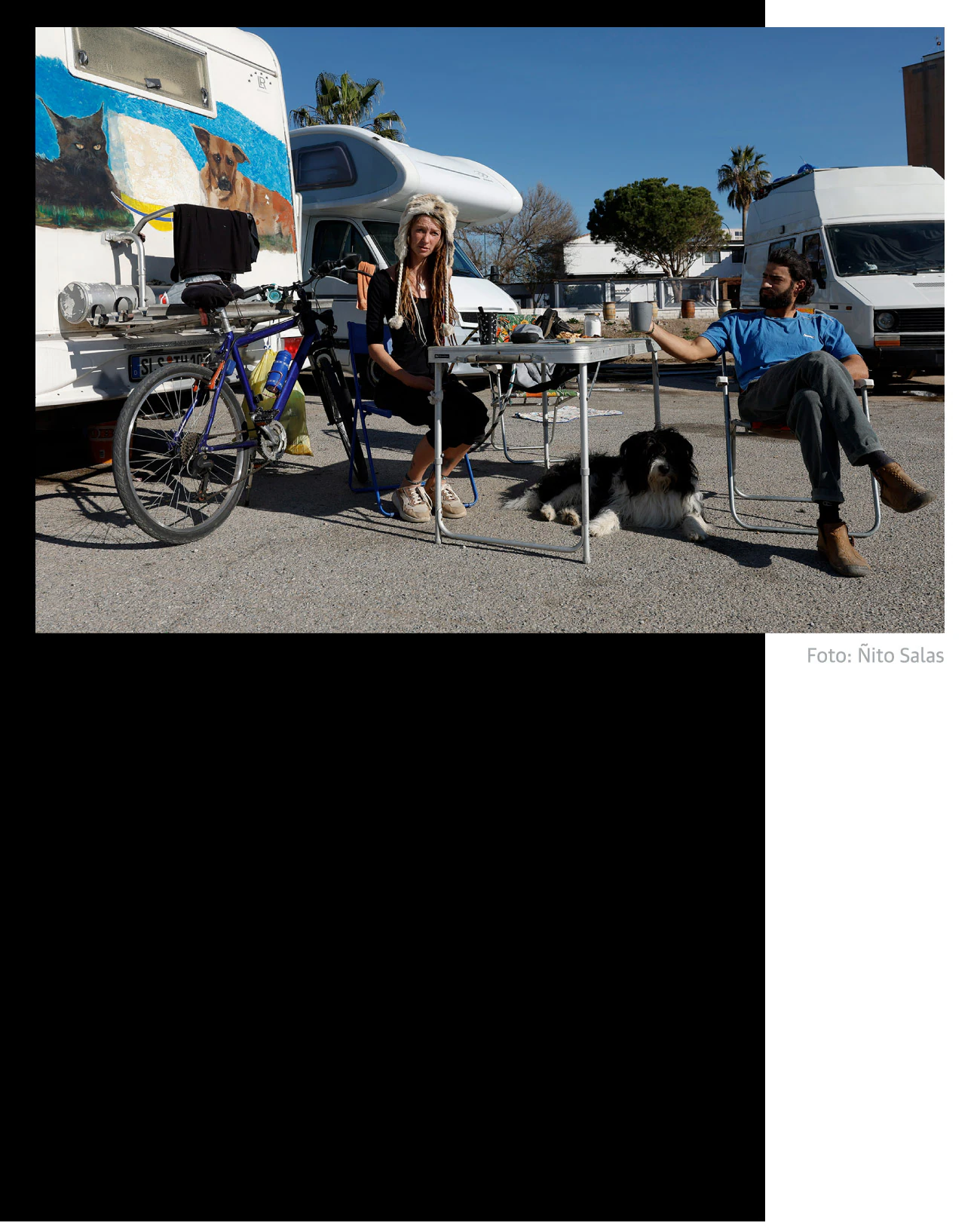
Wilson, 27
Portugal
“You can be a nomad without being a hippy; there are hippies who always live in the same place; I regard myself more nomad than hippy”
Tamara, 33
Germany
“Germany is just one reality and I wanted to see different realities. In rich countries I take whatever work comes my way and I save to continue travelling”
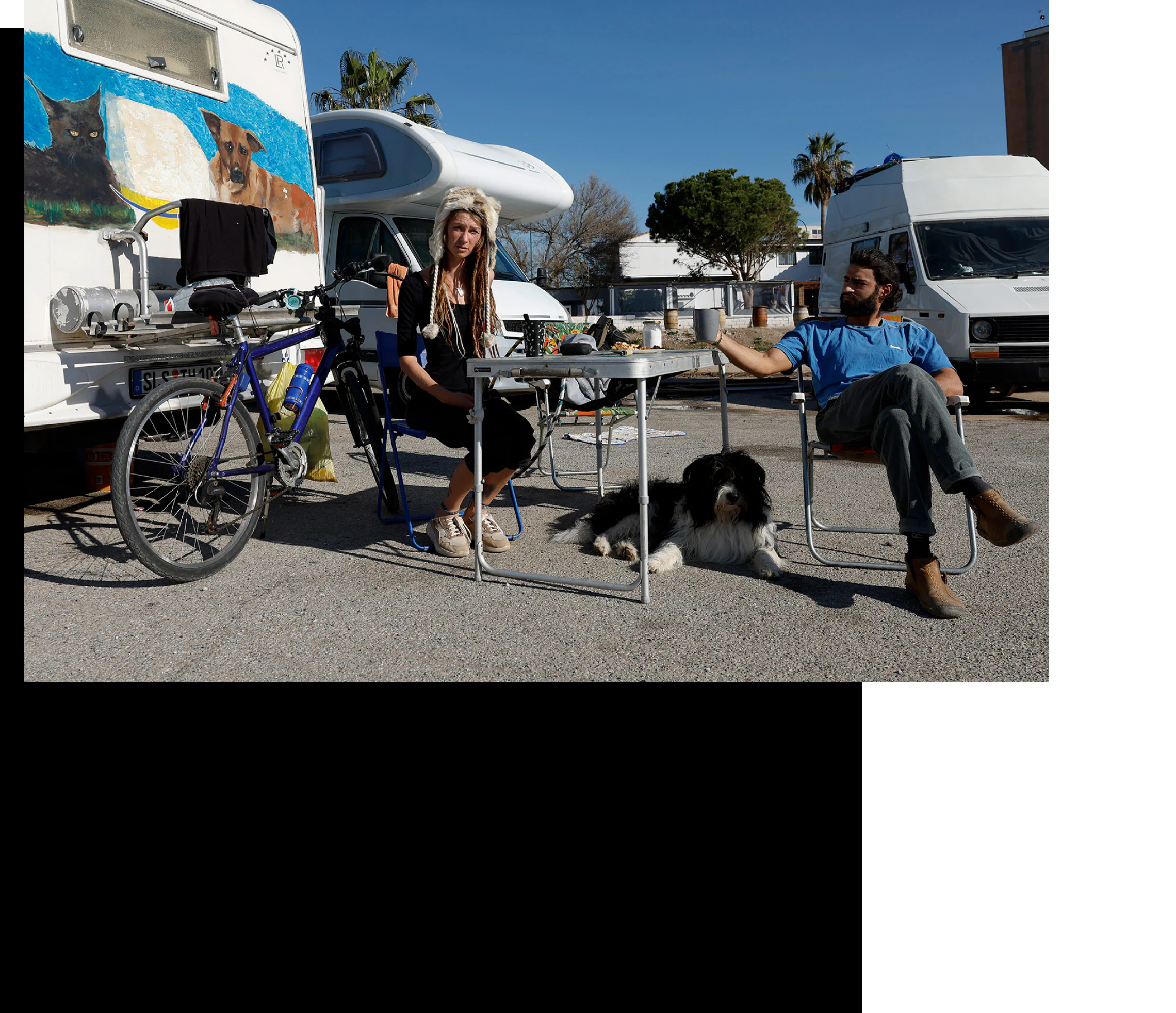
Photo: Ñito Salas
Wilson, 27
Portugal
“You can be a nomad without being a hippy; there are hippies who always live in the same place; I regard myself more nomad than hippy”
Tamara, 33
Germany
“Germany is just one reality and I wanted to see different realities. In rich countries I take whatever work comes my way and I save to continue travelling”
"I like this way of life, sometimes I wake up in a different place every day. And my family likes me being so adventurous," he explains. Is he a hippy? "You can be a nomad without being a hippy; there are hippies who always live in the same place. I regard myself more nomad than hippy."
His viewpoint matches Tamara's, a 33-year-old German, with whom he has become friends after meeting in this unusual neighbourhood where some are just on vacation, others more settled down. Tamara identifies more with the term "alternative". She has been exploring the world for ten years and lives in a tent: "Germany is just one reality and I wanted to see different realities," she says.
To support herself, she takes what work she can, or she sells her arts and crafts when in rich countries with higher salaries (she does not include Spain in that list) and saves up funds to continue travelling. "I have a very German attitude to making money," she states. Will she continue living like this for another ten years? Forever? "I don't know. I enjoy life. I live in the moment." Still, she immediately concedes that, perhaps by the age of 50, she would like to have bought some land in Colombia to stay there six months a year and spend the rest travelling. Is this life dangerous for a woman? She says no. On the contrary, travelling people are kind and helpful. Moreover, she warns: "I have a dog that protects me." Wilson closes with these words: "Anyone who says that this life is dangerous has not fully lived it."
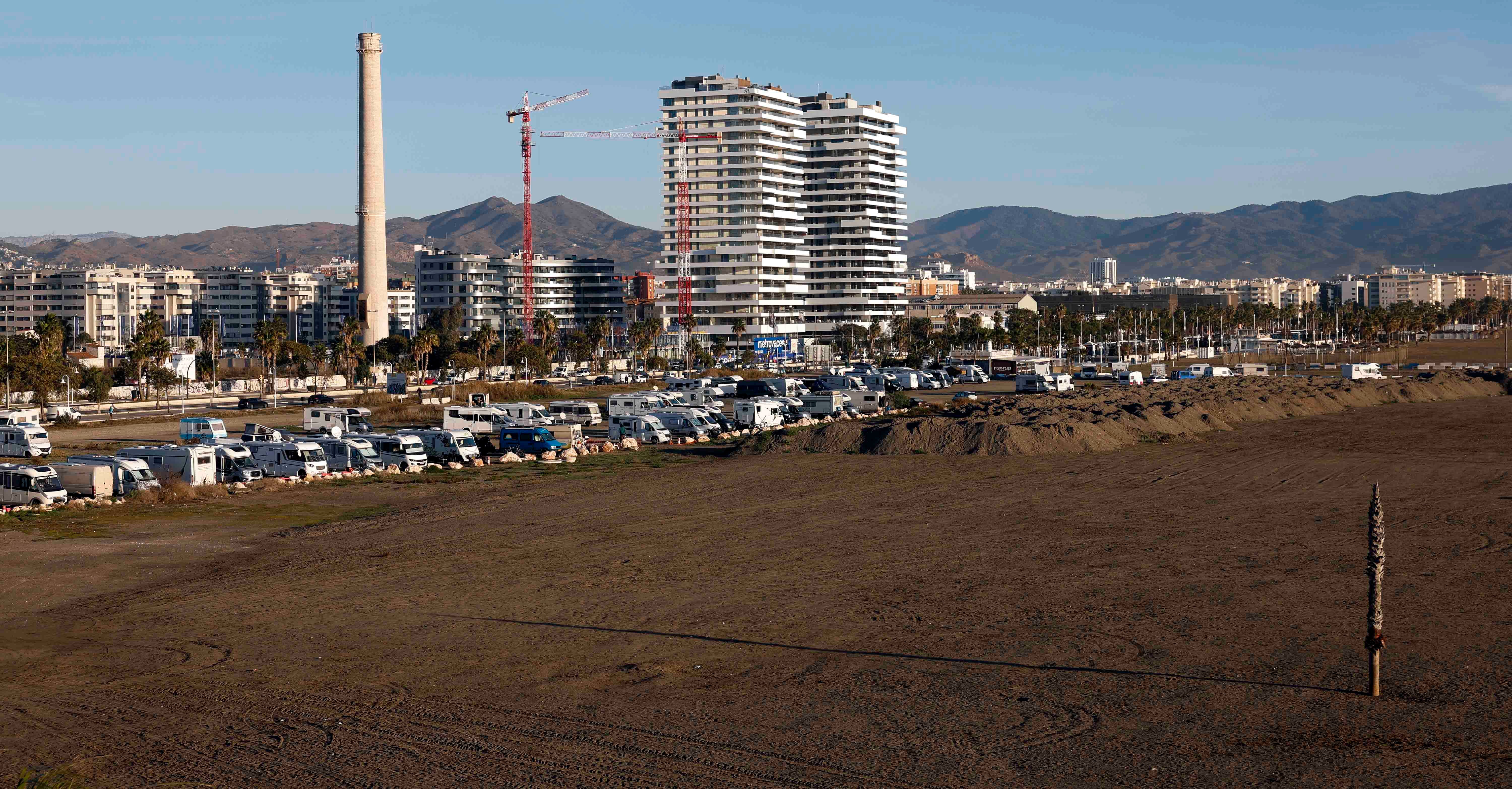
A similar lifestyle of wandering free with no real plans is the current reality for the next couple: Caro, 26 from Germany, and Paul (not his real name), a 33-year-old Scot. He does not want to reveal his identity because he is illegally in Malaga due, he says, to the "madness" of Brexit.
Caravanning has proved to be a quids-in way of life for the couple, as they explain to SUR: an apartment in Scotland would have cost them 1,000 pounds per month and the caravan cost them 15,000 pounds, although their car is some 30 years old.
"Living in an apartment, in addition to being expensive, means that you have no freedom and that you must work every day," says Paul. Would they start a family, live in a caravan with children? The question leaves them confused; clearly they haven't discussed it so are not yet ready to share with SUR readers where their relationship might be headed. They haven't made many plans at all: when they first met in Scotland for Caro's studies, they hatched a plan to travel together, even going so far as to live in a teepee in Portugal.
Beata and Anttoni, Camilla and Claes
Study online, work online
Beata and Anttoni, both 24, are one couple who are very clear that van life is something temporary for them before returning to mainstream life in their native Finland. They are university students studying remotely. She does Social Sciences; he, Business Administration. The van cost them 20,000 euros plus another 15,000 to adapt it to their needs. They feel comfortable in that tiny space, making the most of every millimetre.
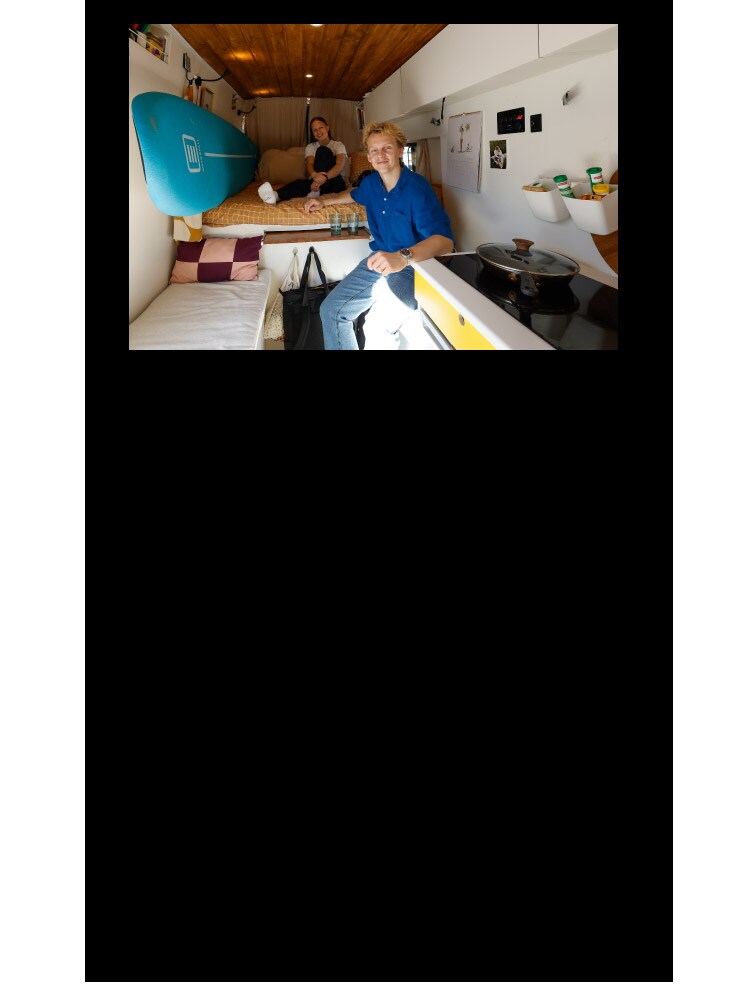
Photo: Ñito Salas
Beata y Anttoni, 24
Finland
“We wanted to make the most of this special time, to travel and have adventures before starting jobs”
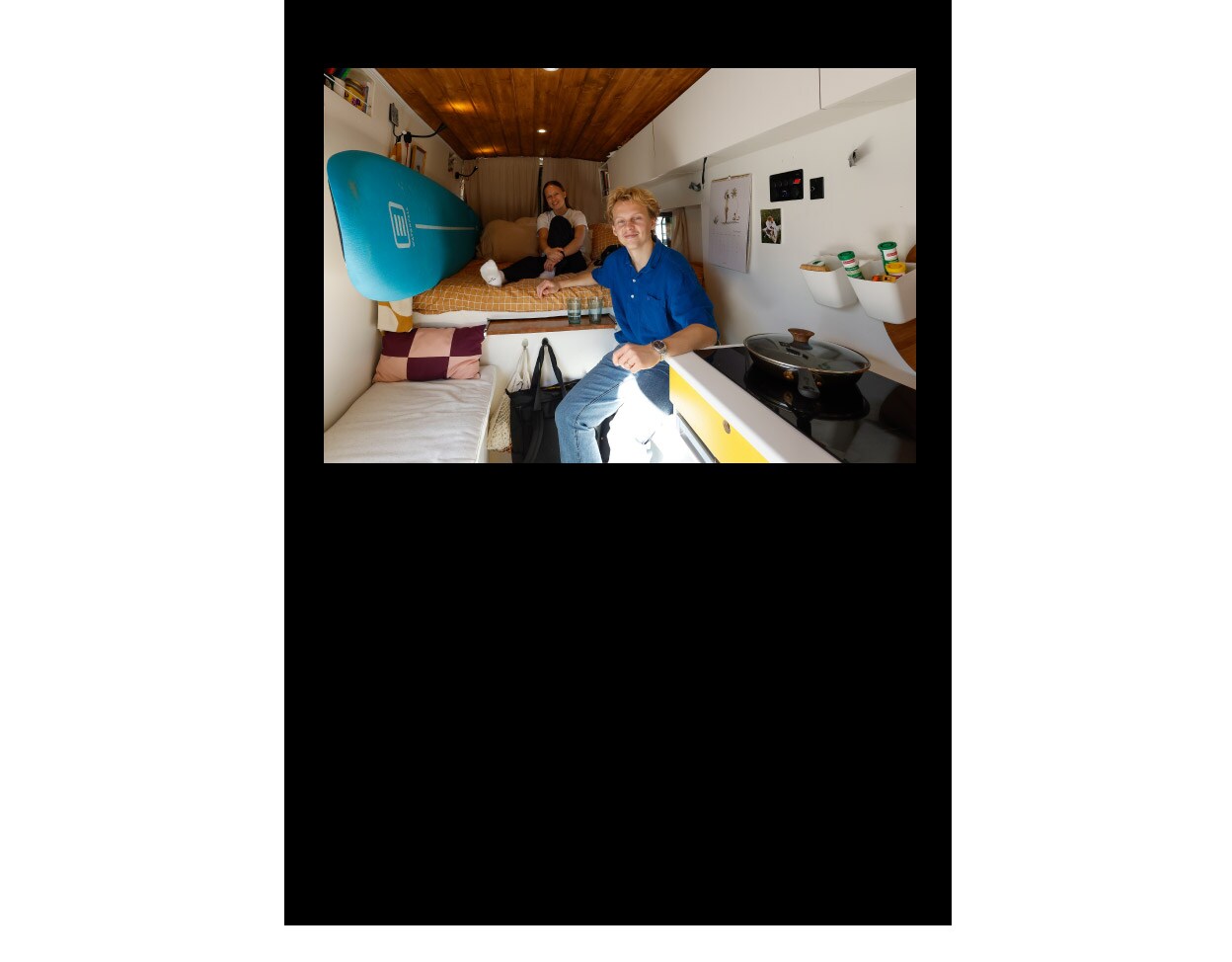
Photo: Ñito Salas
Beata y Anttoni, 24
Finland
“We wanted to make the most of this special time, to travel and have adventures before starting jobs”
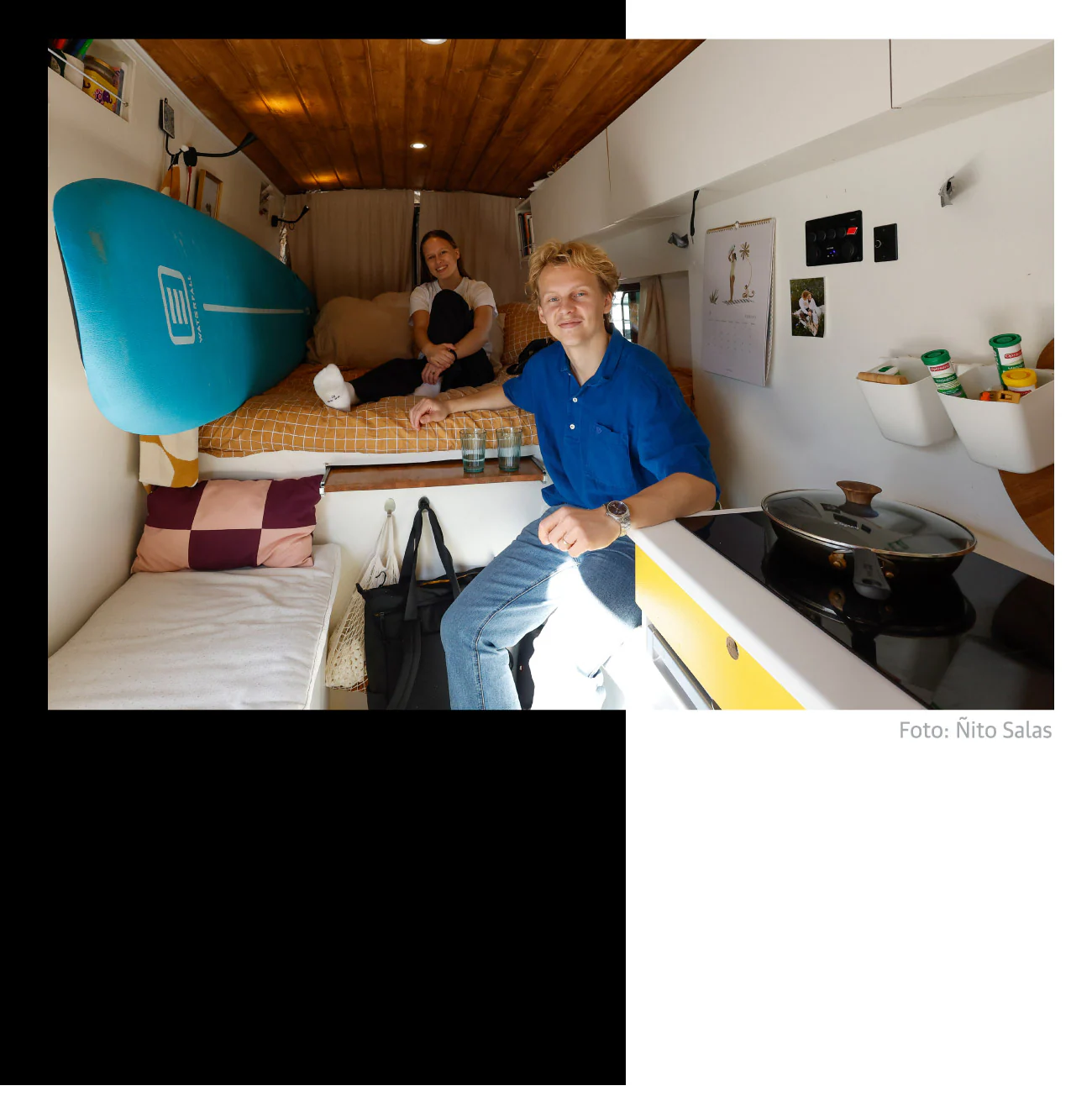
Beata y Anttoni, 24
Finland
“We wanted to make the most of this special time, to travel and have adventures before starting jobs”
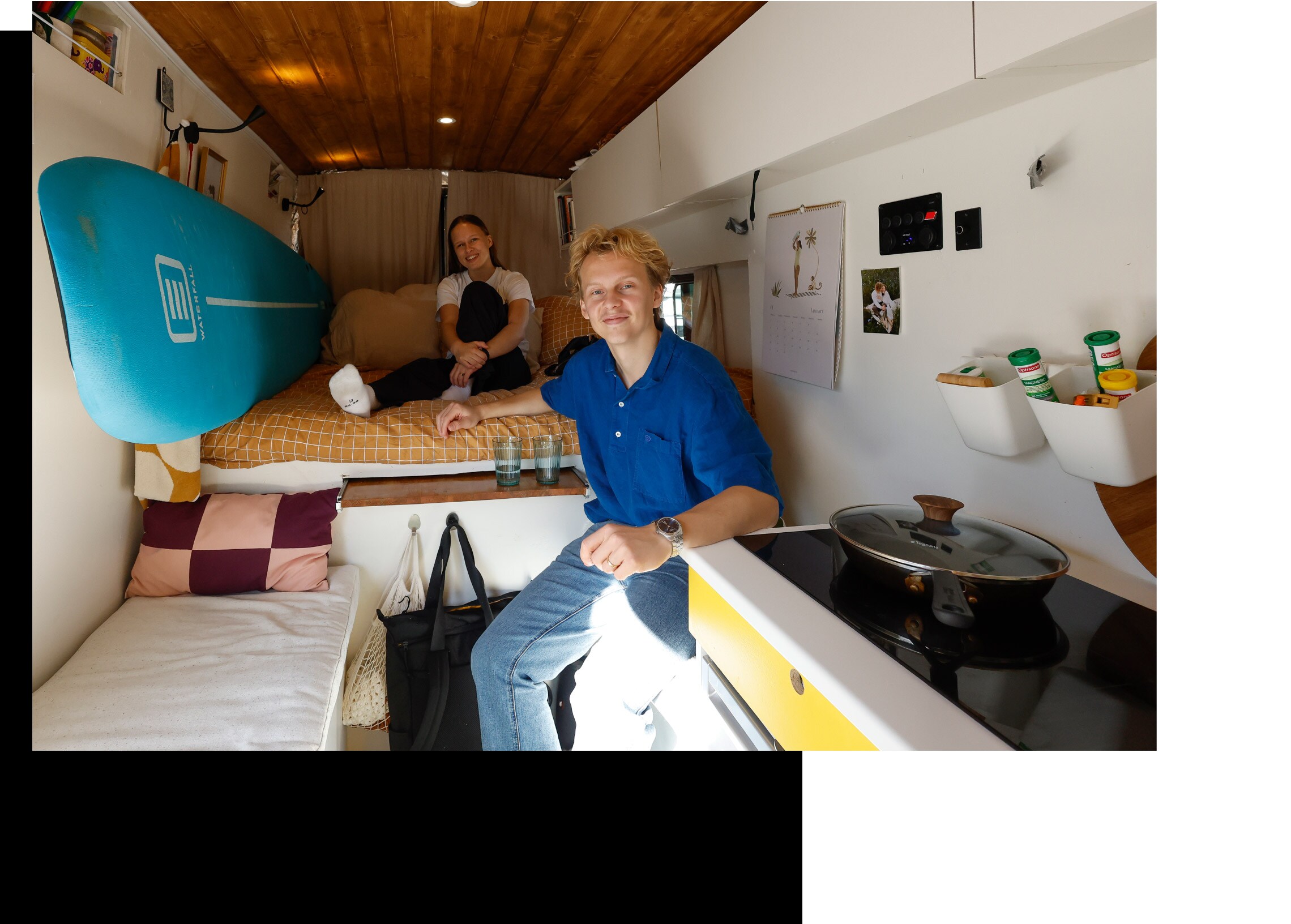
Photo: Ñito Salas
Beata y Anttoni, 24
Finland
“We wanted to make the most of this special time, to travel and have adventures before starting jobs”
They say that they have paid for it all with university grants that otherwise could have been used to pay for an apartment. They are living through a special time that they have given themselves before completing their studies and starting work. They wanted to travel, have adventures, gain some life experiences. They have the unwavering support of their families, they say, although they are missed. They also tell us that they manage to study four hours a day and, so far, they are achieving good grades.
Besides remote learners, there are also teleworkers - or digital nomads - who choose the van life, even if only now and then. While Camilla, 33, can bask in the warm January sun as she reads her novel, her boyfriend, Claes, 34, is engrossed in an online meeting for his company, which operates in the Norwegian oil sector..

Photo: Ñito Salas
Camilla, Sweden, 33 , and Claes, Norway, 34
“We go back to Sweden and Norway from time to time for in-person working. We have our own apartments there. But we don’t like being always in the same place”
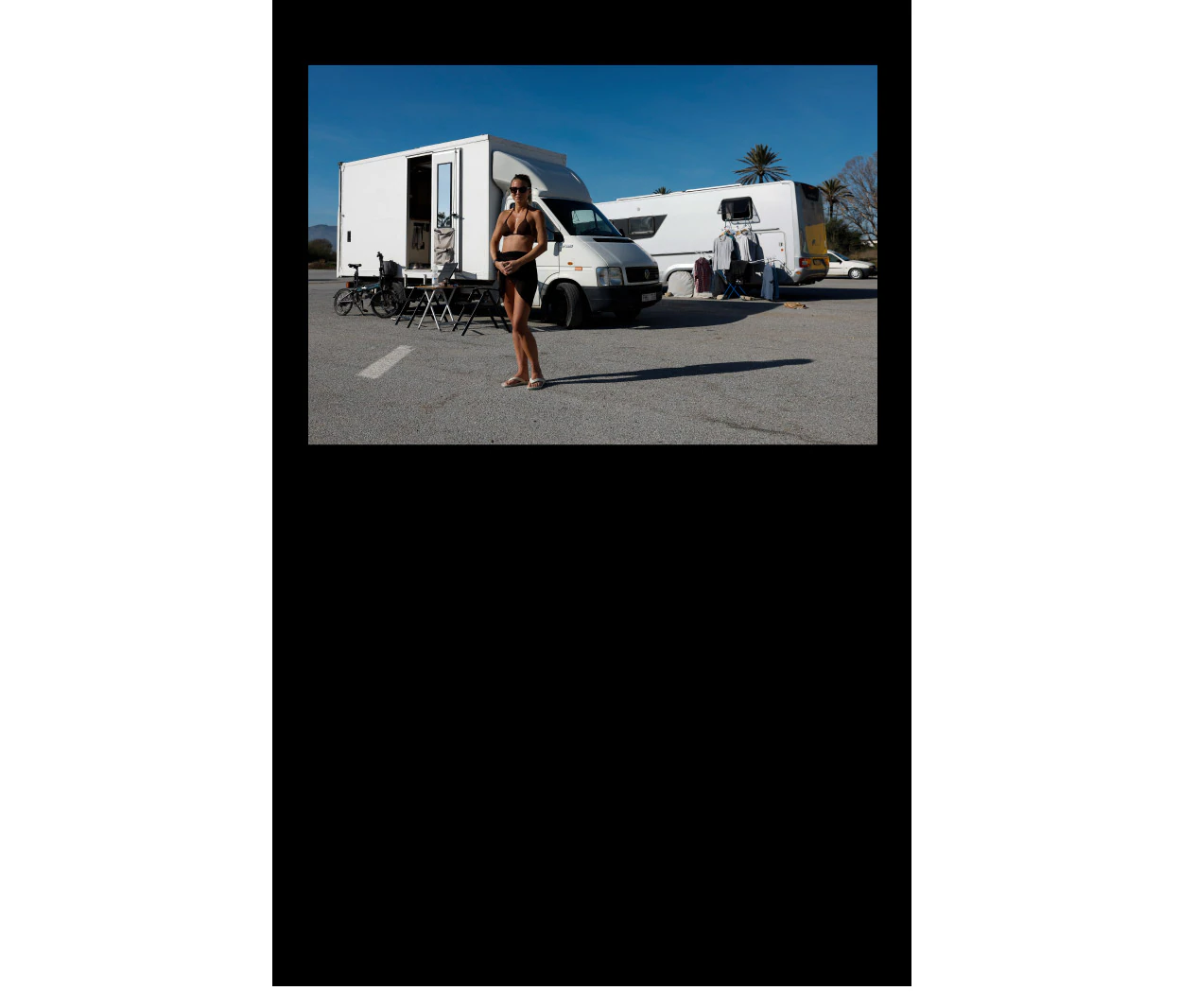
Photo: Ñito Salas
Camilla, Sweden, 33 , and Claes, Norway, 34
“We go back to Sweden and Norway from time to time for in-person working. We have our own apartments there. But we don’t like being always in the same place”.
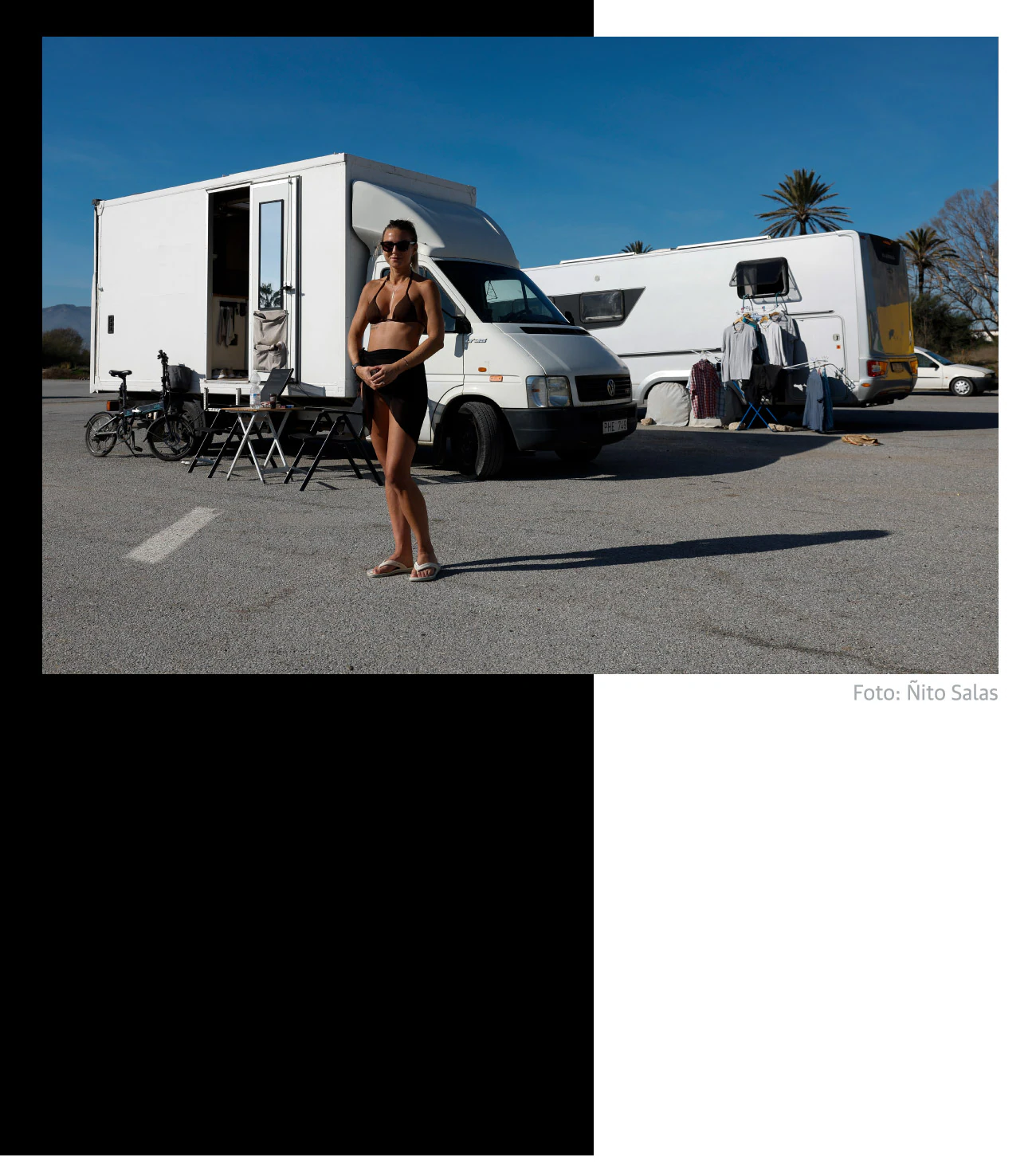
Camilla, Sweden, 33 , y Claes, Norway, 34
“We go back to Sweden and Norway from time to time for in-person working. We have our own apartments there. But we don’t like being always in the same place”
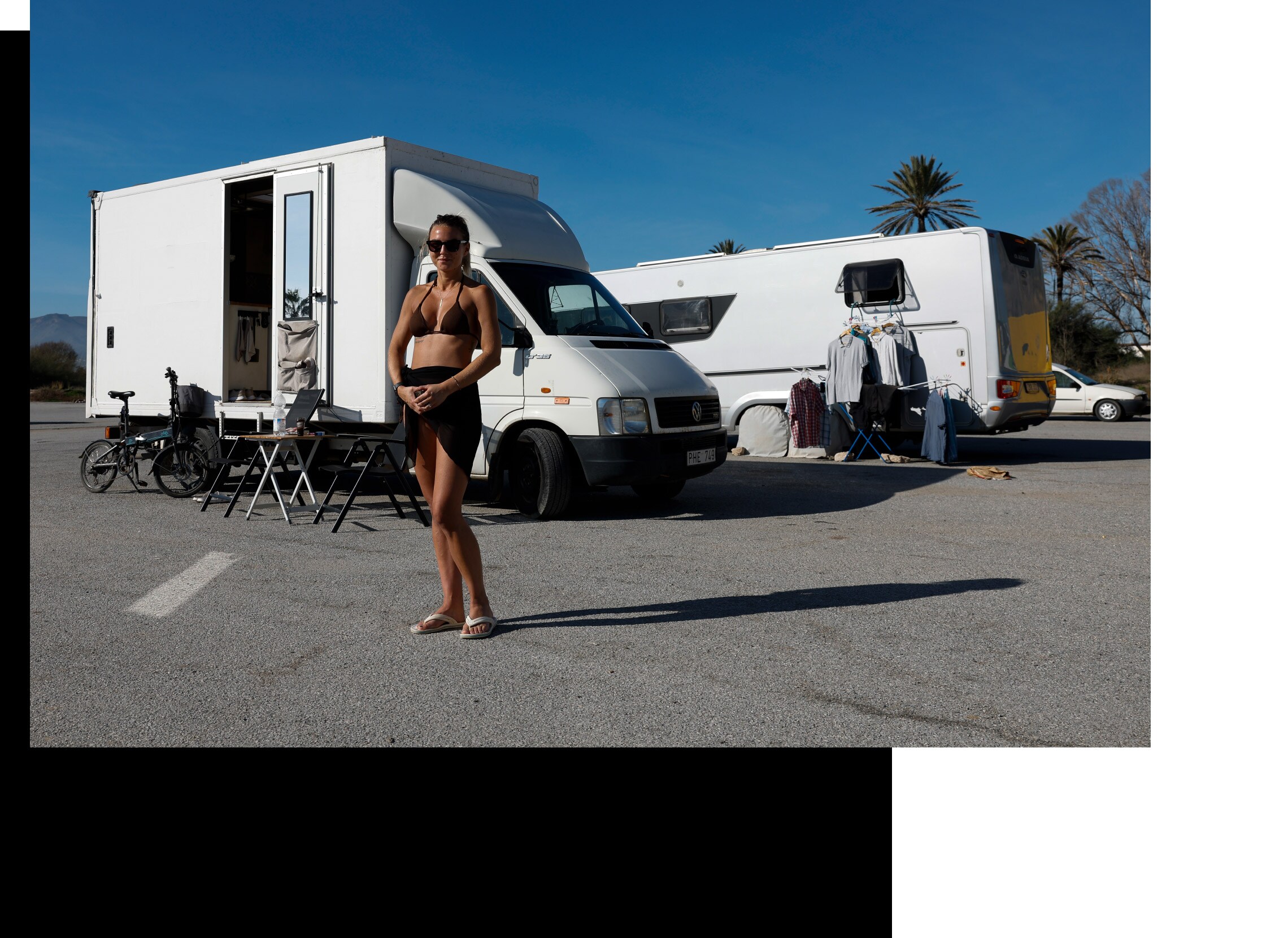
Photo: Ñito Salas
Camilla, Sweden, 33 , and Claes, Norway, 34
“We go back to Sweden and Norway from time to time for in-person working. We have our own apartments there. But we don’t like being always in the same place”
Camilla explains that she is a hairdresser in Sweden, her home country. When she goes back, she has her apartment there and works, while Claes is over in Norway working at his company office. Then they meet up and hit the road again on their travels.
"We don't like always being in the same place," says Camilla. They have been travelling since November, staying in their truck converted into a home on wheels. In Sacaba they get to escape the bitter cold of their Nordic homelands.
As we say goodbye to them, a group of boys who also live there and are doing acrobatic stunts in the street, tell the SUR team: "We live here because we want to and we like it."
¿Tienes una suscripción? Inicia sesión

